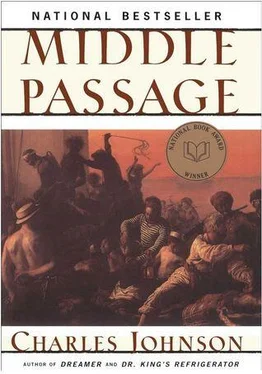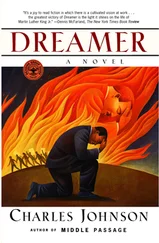“Was it worth it?”
He flinched. “How do you mean?”
“Are you a better man for all that fast living?”
Squibb stared at me, growing sober now. “Yer a strange one, Illinois. Naw, darlin’, I can’t say better.” He laughed suddenly, but with little humor. “Ask my wives — all five of ’em — and they’d probably say I’m worse for it.”
“Five, is it now?”
“Or six.” Squibb shrugged. “I lose count. I gets drunk, ye know, and I forgets I’m married, and a woman comes along, and before I knows it I’ve proposed again, and do ye know what’s odd? I keeps fallin’ in love with the same kinda woman ovah and ovah again. They all look like my wife Maud — God rest her — when we first met. She was a pretty li’l thing. She ruined me, ye know. Spoiled me. I mean, Maud didn’t even mind when I broke wind under the bedsheets: you know that’s love, darlin’. She had long, dark hair, a waist no bigger than that”—he snapped his fingers—“and eyes dark as wine — they all do. They could be her sisters, for all the diff’rence, and damned if I don’t slip sometimes ’n’ call ’em by the pet name I give her — Stinky.” He sighed, perplexed, and rapped his temples with the heel of his palm, as if to shake his brain back in place. “Ain’t the quantity of experiences that count I sometimes think, Illinois, but the quality. It’s sorta like I keep lookin’ for Stinky when she was seventeen so I kin do right by her this time.”
I left him still mumbling into his cup, and Squibb, I’m sure, didn’t notice my absence for an hour. But what he’d said stuck to me like a barnacle. It seemed so Sisyphean, this endless seeking of a single woman’s love — the vision of the first girl who snared his heart — in all others, because they would change, grow old, and he’d again be on a quixotic, Parmenidean quest for beauty beyond the reach of Becoming. Yet he seemed ironically faithful too, despite his several wives, his devotion to Stinky as deep as any monk’s for the Virgin. A peculiar man, this Josiah Squibb, I thought, though really no stranger than the others in Captain Falcon’s ragtag crew. We were forty of a company. And we’d all blundered, failed at bourgeois life in one way or another — we were, to tell the truth, all refugees from responsibility and, like social misfits ever pushing westward to escape citified life, took to the sea as the last frontier that welcomed miscreants, dreamers, and fools. Only one sailor the mate warned me to stay away from, a dark, clean-shaven fellow, with thin brown hair and the air of a parson about him. Cringle pointed him out to me as he tied deadeyes down the deck from where we stood. “That’ll be Nathaniel Meadows,” whispered Cringle, “and I’d not cross him, if I were you.”
I turned to give him a better look; Cringle swung me around.
“Don’t stare at him, fool!”
“He doesn’t look dangerous,” I said.
“Then,” said he, “your judgment of character is worse than your cooking. Meadows signed on to escape the authorities in Liverpool. He murdered his whole family while they slept, according to the skipper. Axed them all. The family dog, two cows, and a goat too.”
I tried to swallow. Failed. “Why?”
“D’ye care to stroll up ’n’ ask him?”
“Oh, no. . wouldn’t think of prying. Hardly my business, you know, that sort of thing. .”
The mate smiled. “Smart boy.”
Slowly, I gained my sea legs. By and by, I learned to keep down my dinner and keep up my end in the cookroom and on deck with this crew of American degenerates and dregs; but there’s little point in describing individually the other men on board, for the voyage to Africa was uneventful, the men on ship capable at their specialties, and not one of them would live to see New Orleans again.
Only Cringle, I suppose, sensed what was coming. He had a sixth sense about disaster. Ankle-deep in deckwash, he’d stand by the bowsprit some nights in the light of a single lantern, wearing a woolen fearnought to blunt the teeth of the wind, and stare. Just stare. The fact is that Cringle, more than all the others, was out of place: an officer by accident, I would learn, whose precise speech the crew saw as pomposity, whose sensitivity Captain Falcon read as weakness. The Republic was, above all else, a ship of men. Without the civilizing presence of women, everyone felt the pressure, the masculine imperative to prove himself equal to a vague standard of manliness in order to be judged “regular.” To fail at this in the eyes of the other men could, I needn’t tell you, make your life at sea quite miserable. It led to posturing among the crew, a tendency to turn themselves into caricatures of the concept of maleness: to strut, keep their chests stuck out and stomachs sucked in, and talk monosyllabically in surly mumbles or grunts because being good at language was womanly. Lord knows, this front was hard to maintain for very long. You had to work at being manly; it took more effort, in a way, than rigging sails. The crewmen had drinking contests nearly every day. They gambled on who could piss the farthest over the rail, or on whose uncircumcised schlong was the longest, and far into the night lie awake in their hammocks swapping jokes about nuns sitting on candles. (And some of these, I must confess, weren’t all that bad, even memorable, such as one Squibb told one night.
Q: What’s the difference between a dog and a fox?
A: About four drinks.)
But Cringle kept his distance; the competition to prove the purity of one’s gender, I’m guessing, made him uncomfortable, even melancholy, and this cost him the respect of the others, who claimed the mate, at age twenty-nine, was a virgin. Little wonder then that he was relaxed only when alone, there on watch, or reading, or talking with me once he learned that I’d grown up in the household of a (Thomist) theologian.
“They can’t feel it,” he said the night before we sighted land, looking back from the rail to where two men were carousing around a lantern. His gaze drifted from me back toward row after row of white-maned, foamy waves. That night the sea was full of explosions, rumblings deep as the earth tremors I’d learned to fear in southern Illinois, like the Devil knocking on the ground’s thin crust. “Three quarters of the world’s surface,” said Cringle, “is covered by that formless Naught, and I dislike it, Calhoun, being hemmed in by Nothing, this bottomless chaos breeding all manner of monstrosities and creatures that defy civilized law. These waters are littered with wrecked vessels. And I’ve seen monsters, oh, yes, such things are real down there.” He laughed bleakly. “Down there, reality fits more the dreams of slugs and snakes than men. ’Tis frightening to me sometimes,” he added, looking from me to his feet, “that all our reasoning and works are so provisional, so damned fragile, and someday we pass away like the stain of breath on a mirror and sink back into that from whence we’ve come.” He fumbled through his pockets for his pipe, then puffed hard to get it going. “They skim along the surface, the others; they have no feeling for what the sea is” . He gave a slow, Byronic sigh. “Sometimes I envy them for their stupidity.”
When he talked like this he frightened me. I wondered if the others were right about his being weak, or enfeebled somehow, and I hardly knew how to reply. “We’ll be on land soon enough. I heard Squibb say we’d put to at the factory within the week.”
The mate smiled gently as if I’d said something stupid. “We’re taking on Allmuseri tribesmen, Calhoun. Not Ashanti. Nor even Kru or Hausa — them, at least, I can understand. Have you ever seen an Allmuseri?”
Читать дальше












